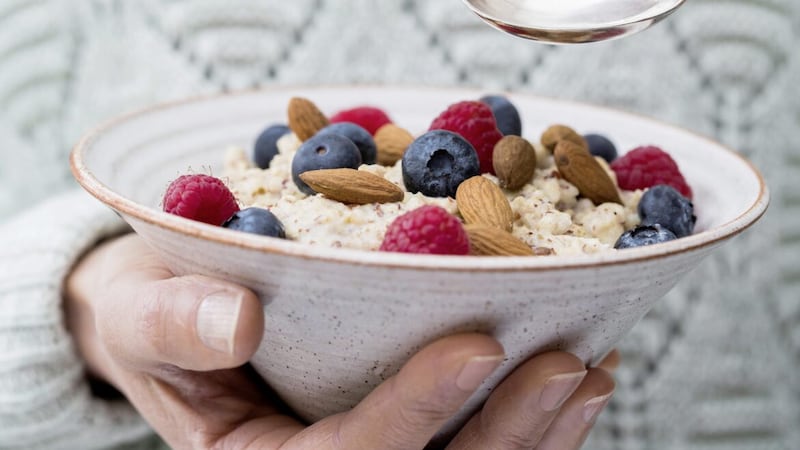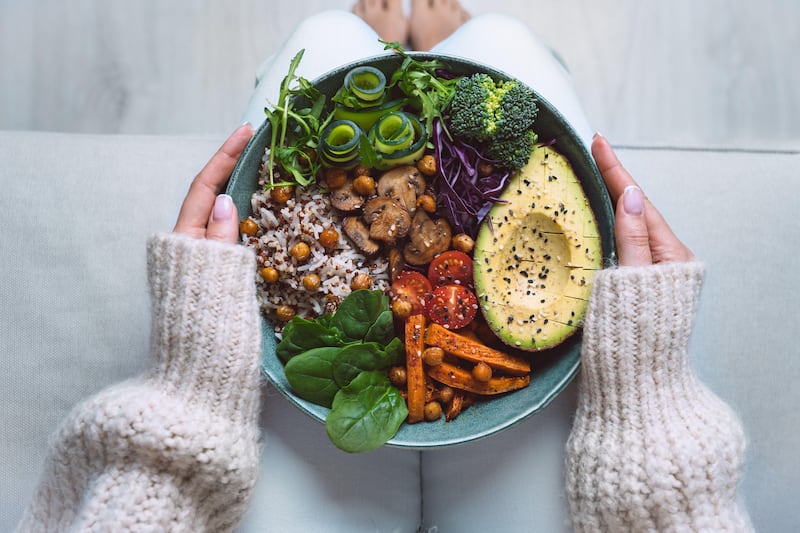PORRIDGE oats have been a staple food in Ireland for generations. I remember my granda making enough porridge to do several days and cutting it by the slice.
Although I am not so keen on his recipe, I am a big fan of oats, so was intrigued to find out what twist chef - and Irish News Weekend colleague - Niall McKenna would put on the humble oat at the White’s Oats world porridge day celebrations this week.
Overnight oats, a banana and oat smoothie with a healthy dollop of peanut butter, and a delicious oat-coated chicken with salsa verde served with a green salad were some of the tasty treats that Niall had to share with us. A long way from a slice of porridge for breakfast.
Oats are so versatile and they are a crop that grows brilliantly in our climate here in Ireland. With more focus on sustainability and supporting local producers, it is great to see local brands like White's Oats continuing to fly the flag for local farmers.
Maybe you have made the switch to porridge for autumn, or maybe you are one of those people (like me) who eat the stuff all year round. Either way, you really are doing your health a favour by getting into the habit of adding oats to your daily diet. Here are just some of the benefits:
1. DIGESTIVE HEALTH
Oats are a lovely balance of both soluble and insoluble fibre, making them gentle on the digestive system.
With so much focus on the gut microbiome in recent years, many of us have been concentrating on packing more prebiotics on to our plate.
Oats contain a type of fibre called beta-glucans that our friendly probiotic bacteria thrive on. They turn this fibre into by-products that support the health of our digestive system.
Choose your favourite type of unsweetened oats (rolled, jumbo, pinhead) and for extra gut health benefits, add in some milled flaxseed or chia seeds and a handful of berries or some grated apple for a perfect start to your day.
2. SUSTAINED ENERGY
Slow, sustained release energy from low GI oats will help to sustain balanced blood glucose levels as well as maintain a stable insulin response.
This will help to keep your energy levels topped up throughout the morning. Sometimes people tell me that porridge makes them feel hungry. Try swapping to jumbo oats (which are lower glycemic index) and adding a decent protein source (like nuts, seeds or natural yoghurt) and that should make all the difference.
3. CARDIOVASCULAR SUPPORT
Eating oats on a regular basis has been found to reduce three markers of cardiovascular disease. Oats are thought to help reduce levels of LDL cholesterol (the bad one), apolipoprotein B and non-HDL cholesterol (measured by subtracting total cholesterol from HDL cholesterol).
4. WEIGHT MANAGEMENT
The balance of fibre in oats, and in particular beta glucan, is thought to have a regulatory effect on our satiety hormones so we feel fuller for longer, reducing the urge to snack on junk food and sugary stuff between meals.
The balancing effects that oats have on blood glucose and insulin is another good reason why oats can help support healthy weight management as part of a calorie controlled diet. Just make sure that you are not choosing oats that are packed with sugar. Keep it simple and add your own spices (cinnamon, nutmeg or ginger are great) and fruit (try berries, stewed apple or poached pear) for flavour.
5. IMMUNE SUPPORT
Feed your immune system with oats as part of your winter nutrition plan for a healthy dose of antioxidants and minerals. Back to beta-glucan again - this fibre seems to have super powers for our white blood cells, helping to stimulate their production and fight off infection.








